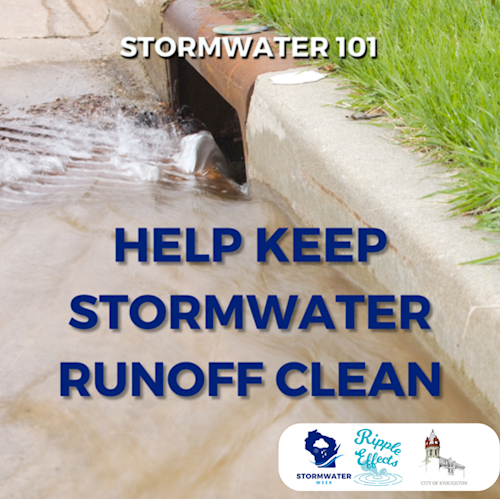
Stormwater Utility • Public Outreach
Winter Salt Week
January 27-31,2025
We rely on salt to keep our roads safe in the winter and to soften water in our homes year-round but using more salt than is needed comes with a heavy price. In Wisconsin and much of the United States, chloride from salt is infiltrating into our lakes, streams and groundwater. Learn more about #thetruecostofsalt and how you can make a difference.
Become Wisconsin Salt Wise!
Working together to keep freshwater fresh!
During the winter months we rely on salt to keep our roads safe, however chloride from salt is infiltrating our lakes, streams and ground water. Did you know that it only takes 1 teaspoon of salt to pollute 5 gallons of water to a level that is toxic for freshwater ecosystems? Taking the right steps to reduce the amount of salt used, yet keeping our roads safe during a snow and ice event, can reduce the amount of chloride entering in to our lakes and streams. Check out the links below so you too can become salt wise!
Salt Wise - Working together to keep freshwater fresh!
Stormwater 101
Have you ever wondered what causes stormwater runoff and pollution? Learn about the basics of stormwater pollution, how it happens, where it comes from, and simple things you can do to prevent it. Understanding the impact of stormwater pollution is crucial for protecting our water resources, preserving biodiversity, and ensuring the availability of clean water for future generations.
Rain Collection
Have you ever wondered what causes stormwater runoff and pollution? Learn about the basics of stormwater pollution, how it happens, where it comes from, and simple things you can do to prevent it. Understanding the impact of stormwater pollution is crucial for protecting our water resources, preserving biodiversity, and ensuring the availability of clean water for future generations.
Lawn Care
In today’s topic, we will explore the importance of keeping grass clippings in your yard and off the street. By allowing the clippings to decompose and release nutrients slowly, you can provide a natural, sustainable source of lawn fertilizer that does not cost extra! Let's dive in and explore how you can contribute to cleaner, healthier waterways right from your backyard.
Leaves
Trees are a good thing! However, leaves sitting on sidewalks and roadways can have unintended consequences. Learn how excess nutrients from leaves make their way to our shared waterways.
Leaf-free Streets for Clean Waters
Sign up to receive alerts reminding you when rain is on the way and it’s time to take action. Alerts will be sent via text (or email) 1-2 days before a rain event reminding you that it’s time to remove street leaves.
City of Stoughton Fall Leaf Collection from October 12th- December 1st
Only Rain Down the Drain
Did you know that storm drains pour directly into our rivers and lakes, often with little or no treatment? This is why it is important to prevent pollution.
Clean Sweep
Report Spills and Pollution
Animal Waste
Storm Drain Marking
Storm Drain Murals
ADOPT A STORM DRAIN- Keep storm drains clean and clear to prevent flooding and protect our waters. Sign up as a individual, a group or for a classroom project and get a kit to help you keep your inlet clean! Adopt yours today HERE!
Place leaves in the terrace for the City of Stoughton Fall Leaf Collection from October 12th- November 22nd
Build a Rain Garden!
A rain garden is a depressed area in the landscape that collects rain water from down spouts, driveways or streets and allows it to soak in to the ground to be naturally filtered. Planted grasses, native plants and flowering perennials can be a beautiful addition to your landscape and reduce run off from your property. See below on how you can build your rain garden and redirect your downspouts to keep run off on your property.
Lawn Care Pollution Prevention
See below the simple steps that you can do to reduce pollution of fertilizers, pesticides and other toxic chemicals from entering our lakes, streams and rivers. Watch the video below of Christal Campbell, a storm water education coordinator of Madison Area Municipal Stormwater Partnership, use a rain simulator to show storm water pollution.
WI Salt Wise Wednesday Webinars!
Catch the latest in Salt Wise happenings via YouTube-livestreamed conversations over the noon hour with private contractors, facility managers, and more. Tune in live to ask questions over the chat. Register in advance to receive a reminder email with a direct link the morning of the program.
It only takes 1 teaspoon of salt to pollute 5 gallons of water to a level that is toxic for freshwater ecosystems. We can all work together to use the right amount of salt!
Tips for motorists to stay safe this winter
The goal of winter procedures is to maintain "passable roadways," or roadways that are free of drifts, snow ridges and as much ice and snow as possible. But expectations for perfect driving conditions have caused us to use excess deicing materials every year. Rather than depending on summer driving conditions in a Wisconsin winter, accept that our weather involves ice and snow. If possible, stay off the roads when it’s snowing. If you must go out remember that snow and ice should be treated as an emergency, so travel accordingly. Read this Motorist Handout for helpful tips!







